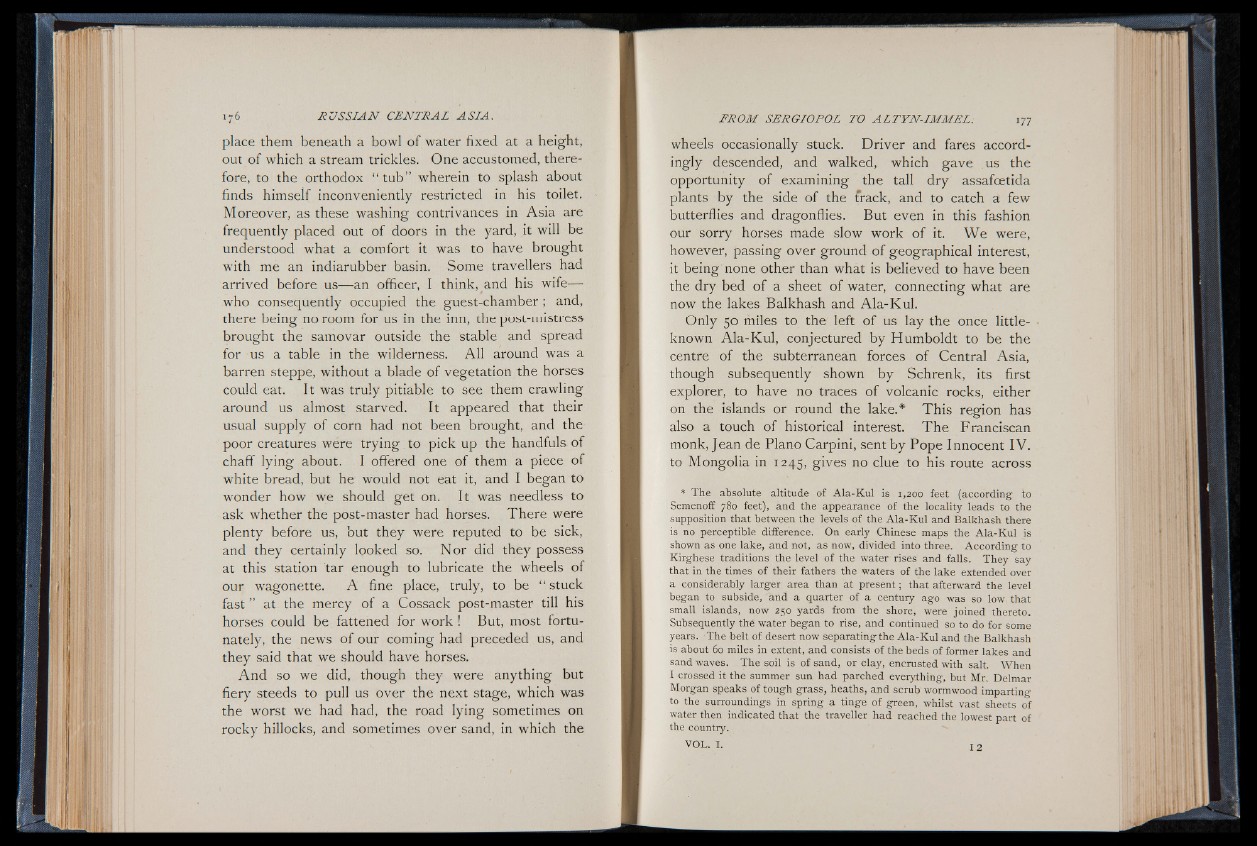
place them beneath a bowl of water fixed at a height,
out of which a stream trickles. One accustomed, therefore,
to the orthodox “ tub” wherein to splash about
finds himself inconveniently restricted in his toilet.
Moreover, as these washing contrivances in Asia are
frequently placed out of doors in the yard, it will be
understood what a comfort it was to have brought
with me an indiarubber basin. Some travellers had
arrived before us— an officer, I think, and his wife—
who consequently occupied the guest-chamber ; and,
there being no room for us in the inn, the post-mistress
brought the samovar outside the stable and spread
for us a table in the wilderness. All around was a
barren steppe, without a blade of vegetation the horses
could eat. It was truly pitiable to see them crawling
around us almost starved. It appeared that their
usual supply of corn had not been brought, and the
poor creatures were trying to pick up the handfuls of
chaff lying about. I offered one of them a piece of
white bread, but he would not eat it, and I began to
wonder how we should get on. It was needless to
ask whether the post-master had horses. There were
plenty before us, but they were reputed to be sick,
and they certainly looked so. Nor did they possess
at this station tar enough to lubricate the wheels of
our wagonette. A fine place, truly, to be “ stuck
fa s t” at the mercy of a Cossack post-master till his
horses could be fattened for work ! But, most fortunately,
the news of our coming had preceded us, and
they said that we should have horses.
And so we did, though they were anything but
fiery steeds to pull us over the next stage, which was
the worst we had had, the road lying sometimes on
rocky hillocks, and sometimes over sand, in which the
wheels occasionally stuck. Driver and fares accordingly
descended, and walked, which gave us the
opportunity of examining the tall dry assafcetida
plants by the side of the frack, and to catch a few
butterflies and dragonflies. But even in this fashion
our sorry horses made slow work of it. We were,
however, passing over ground of geographical interest,
it being none other than what is believed to have been
the dry bed of a sheet of water, connecting what are
now the lakes Balkhash and Ala-Kul.
Only 50 miles to the left of us lay the once little-
known Ala-Kul, conjectured by Humboldt to be the
centre of the subterranean forces of Central Asia,
though subsequently shown by Schrenk, its first
explorer, to have no traces of volcanic rocks, either
on the islands or round the lake.* This region has
also a touch of historical interest. The Franciscan
monk, Jean de Plano Carpini, sent by Pope Innocent IV.
to Mongolia in 1245, gives no clue to his route across
* The absolute altitude of Ala-Ku l is 1,200 feet (according to
Semenoff 780 feet), and the appearance of the locality leads to the
supposition that between the levels of the A la-Ku l and Balkhash there
is no perceptible difference. On early Chinese maps the Ala-Ku l is
shown as one lake, and not, as now, divided into three. According to
Kirghese traditions the level of the water rises and falls. They say
that in the times of their fathers the waters of the lake extended over
a considerably larger area than at present ; that afterward the level
began to subside, and a quarter of a century ago was so low that
small islands, now 250 yards from the shore, were joined thereto.
Subsequently thé water began to rise, and continued so to do for some
years. The belt of desert now separating the A la-Ku l and the Balkhash
is about 60 miles in extent, and consists of the beds of former lakes and
sand w aves. The soil is of sand, or clay, encrusted with salt. When
I crossed it the summer sun had parched everything, but Mr. Delmar
Morgan speaks of tough grass, heaths, and scrub wormwood imparting
to the surroundings in spring a tinge of green, whilst vast sheets of
water then indicated that the traveller had reached the lowest part of
the country.
VOL. I. I2